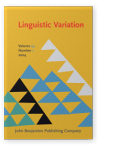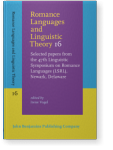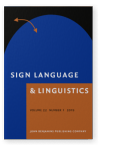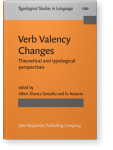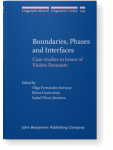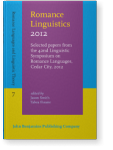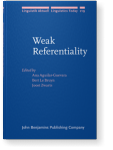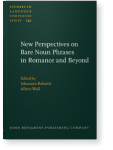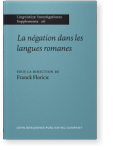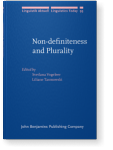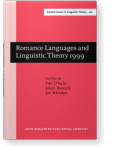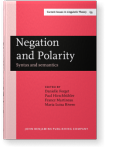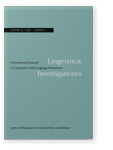M. Teresa Espinal
List of John Benjamins publications for which M. Teresa Espinal plays a role.
2024 From a movement verb to an epistemic discourse marker: The diachronic change of Spanish vaya Linguistic Variation 24:1, pp. 1–36 | Article
Besides its main use as a form of the movement verb ir ‘to go’, the Spanish form vaya (lit. go) is also used as a verbal discourse marker. Here we trace this transition from a purely verbal form to a discourse marker by searching a historical corpus of documents in Spanish, which reveals the… read more
2020 Number as an adjunct in Romance Romance Languages and Linguistic Theory 16: Selected papers from the 47th Linguistic Symposium on Romance Languages (LSRL), Newark, Delaware, Vogel, Irene (ed.), pp. 77–92 | Chapter
In this paper, we argue that Spanish (and other Romance languages such as Catalan), contrary to what has been believed up to now, patterns with languages such as Brazilian Portuguese and French. We present several different arguments to support our proposal that in the Romance languages we… read more
2019 The noun-verb distinction in Catalan Sign Language: An exo-skeletal approach Sign Language & Linguistics 22:1, pp. 1–43 | Article
This paper investigates the morpho-phonological differences between the members of related noun-verb pairs in Catalan Sign Language. Like parallel investigations in other sign languages, our experimental work provides evidence that the major differentiating factors between related nouns and… read more
2017 Morphosyntactic defectiveness in complex predicate formation Verb Valency Changes: Theoretical and typological perspectives, Álvarez González, Albert and Ia Navarro (eds.), pp. 31–49 | Chapter
This article focuses on verb valency change in complex predicate formation by noun incorporation. I reassess the claim that incorporated nouns and clitics in both Uto-Aztecan and Romance languages are morphosyntactically defective, and I show that crucially morphosyntactic defectiveness, but not… read more
2017 On weak definites and their contribution to event kinds Boundaries, Phases and Interfaces: Case studies in honor of Violeta Demonte, Fernández-Soriano, Olga, Elena Castroviejo Miró and Isabel Pérez-Jiménez (eds.), pp. 129–150 | Chapter
In this paper we focus on the meaning of definite DPs that allow a weak reading. We review three different proposals for weak definites, and we present a new analysis with special reference to Romance languages. We submit that the eventual weak reading of a definite DP and its contribution to a… read more
2015 On the structure of bare nominals in Brazilian Portuguese Romance Linguistics 2012: Selected papers from the 42nd Linguistic Symposium on Romance Languages (LSRL), Cedar City, Utah, 20-22 April 2012, Smith, Jason and Tabea Ihsane (eds.), pp. 215–228 | Article
Brazilian Portuguese (BrP) is different from other Romance languages in allowing bare nominals in argument position. In this paper we focus on the apparent differences between this language and other Romance languages, and on the structure that bare nominals have in this language. We argue… read more
2014 Weak referentiality and Russian instrumental nominals Weak Referentiality, Aguilar-Guevara, Ana, Bert Le Bruyn and Joost Zwarts (eds.), pp. 101–128 | Article
This paper focuses on weak instrumental nominals in Russian and it shows their similarities, both from a semantic and a syntactic point of view, with bare predicates in Romance languages, namely Catalan. These nominal expressions are property-denoting expressions that show non-unique reference. We… read more
2013 Bare nominals, bare predicates: Properties and related types New Perspectives on Bare Noun Phrases in Romance and Beyond, Kabatek, Johannes and Albert Wall (eds.), pp. 63–94 | Article
In this paper I will address the topic of identifying the semantic types that can be associated with bare nominals (BNs) in Romance languages such as Catalan and Spanish. I will show that, even in argument position, BNs do not always have a referential index (Baker 2003) and may occur as syntactic… read more
2007 Licensing expletive negation and negative concord in Romance languages La négation dans les langues romanes, Floricic, Franck (dir.), pp. 49–74 | Article
2006 Bare nouns, number and types of incorporation Non-definiteness and Plurality, Vogeleer, Svetlana and Liliane Tasmowski (eds.), pp. 51–79 | Article
2001 Property denoting objects in idiomatic constructions Romance Languages and Linguistic Theory 1999: Selected papers from ‘Going Romance’ 1999, Leiden, 9–11 December 1999, D’hulst, Yves, Johan Rooryck and Jan Schroten (eds.), pp. 117–142 | Article
1997 Non-Negative Negation and Wh-Exclamatives Negation and Polarity: Syntax and semantics. Selected papers from the colloquium Negation: Syntax and Semantics. Ottawa, 11–13 May 1995, Forget, Danielle, Paul Hirschbühler, France Martineau and María Luisa Rivero (eds.), pp. 75–94 | Article
1991 On Expletive Negation Some Remarks With Regard to Catalan Lingvisticæ Investigationes 15:1, pp. 41–65 | Article
The aim of this paper is to identify which syntactic structures allow the interpretation of meaningless or expletive negation and under what conditions formal negation appears in the syntax of natural languages, with especial reference to Central Catalan. I shall describe two syntactic… read more
